The Class of ’39 Award for Excellence
This award, endowed by the Great Class of 1939, is presented annually to one distinguished member of the faculty whose outstanding contributions for a five-year period have been judged by her/his peers to represent the highest achievement of service to the student body, university, community, state or nation. The recipient also becomes an honorary member of the class and is provided a monetary award equal to the value of $5,000 in 1989 dollars - worth approximately $10,000 today. Recipients are recognized at one of the December graduation ceremonies and also in a ceremony at the ’39 Bell Tower in the Carillon Gardens.
The Great Class of 1939 established the Award for Excellence in 1989 to commemorate the fiftieth anniversary of the class. The Great Class of 1939, characterized by remarkable service to Clemson University, the community, the state, and the nation, created this award to recognize and inspire faculty service that exceeds expectations.
A call for nominations is sent from the Faculty Senate Office to all faculty early in the fall semester. For more details, refer to the Class of ’39 Award guidelines (PDF). The nomination form (PDF) must be completed and submitted by October 28, 2024, to be considered by the review committee. The Faculty Senate President, in consultation with the Senate Advisory Committee, appoints a Review Committee of five voting members to include two of the most recent winners, with the newest winner serving as chair. The Provost serves as an ex-officio, non-voting member.
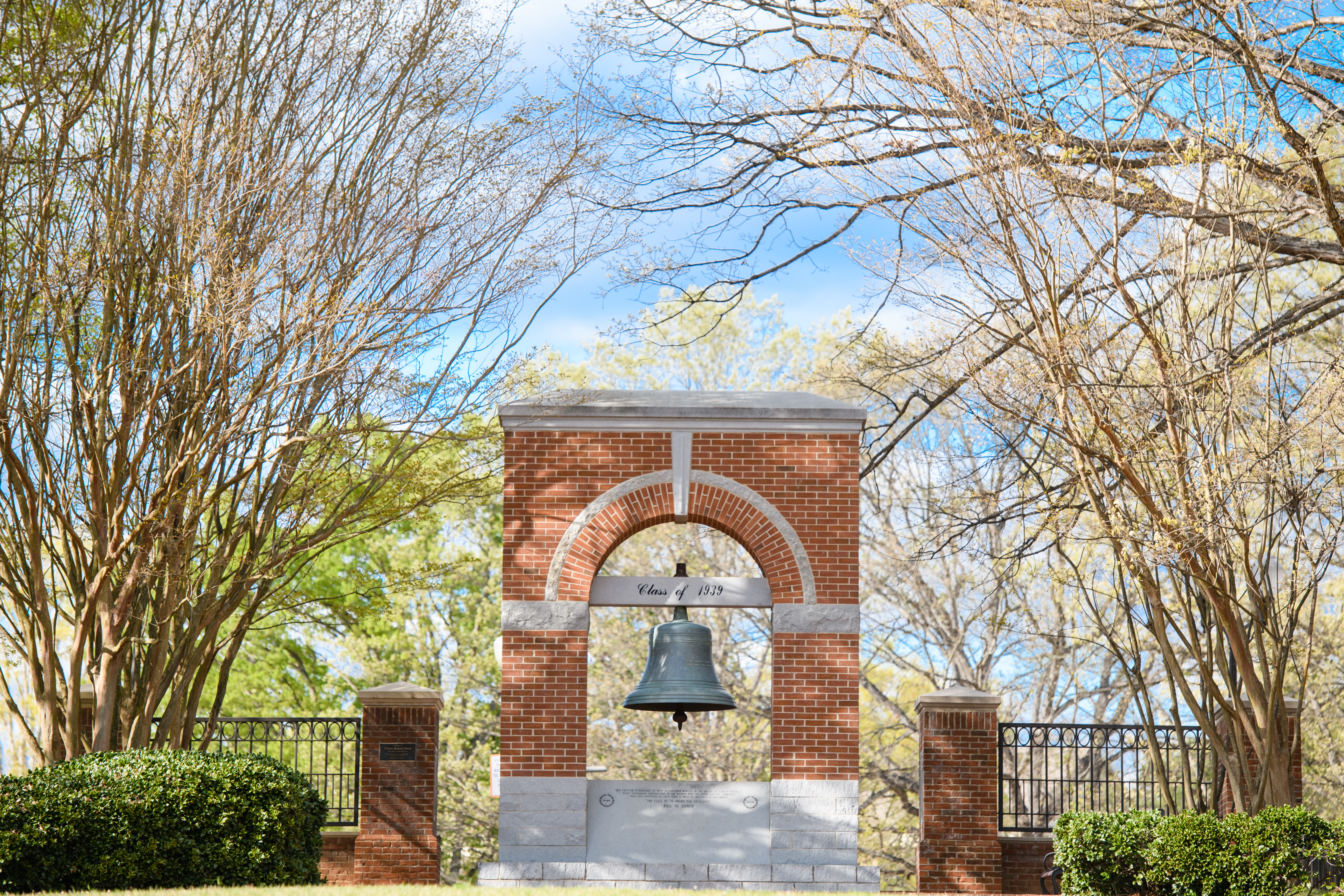
Award Winners

2024- Robert Baldwin
Dr. Baldwin becomes our newest honorary member of The Great Class of 1939.
Rob Baldwin was raised in Maine where he developed an appreciation for forests, forestry, and wildlife. He attended Colby College. During a year in the zoology department at the University of Edinburgh in Scotland, he became enamored with applying science to conserving biodiversity. He was a research assistant at the National Zoological Park at the Smithsonian and during that time, received his Master’s in biology from George Mason University. He worked as a field researcher and teacher and eventually received a PhD in Ecology and Environmental Science from the University of Maine. He began as an assistant professor in the Department of Forestry and Environmental Conservation in 2008 and was later promoted to full professor and Margaret H. Lloyd Endowed Chair in 2017. He mentored numerous graduate students to completion of their degrees and served on dozens of other graduate committees, and as Endowed Chair began a research and environmental education program at the Hardscramble Preserve. He helped found the Tigers United University Consortium and promoted conservation research in India, and throughout his career conducted research in the Clemson Experimental Forest. He is the Executive Director of the Clemson Experimental Forest, where he hopes to engage the entire university community in its beauty and potential as a resource for research, teaching, outreach, and recreation. Based on his research, the Board of Trustees approved the adoption of approximately 3,265 total acres of the Forest as ecologically sensitive areas to create old growth, ecologically diverse forests, and provide unique opportunities for research and education. Rob is married to Dr. Elizabeth Baldwin of Clemson University. His daughter Ella Baldwin is a law student at the University of South Carolina and his son Julian is a high school senior, committed to play baseball at USC Sumter. Rob loves to read, write, hike in the forest, drink a glass of wine, and sail.
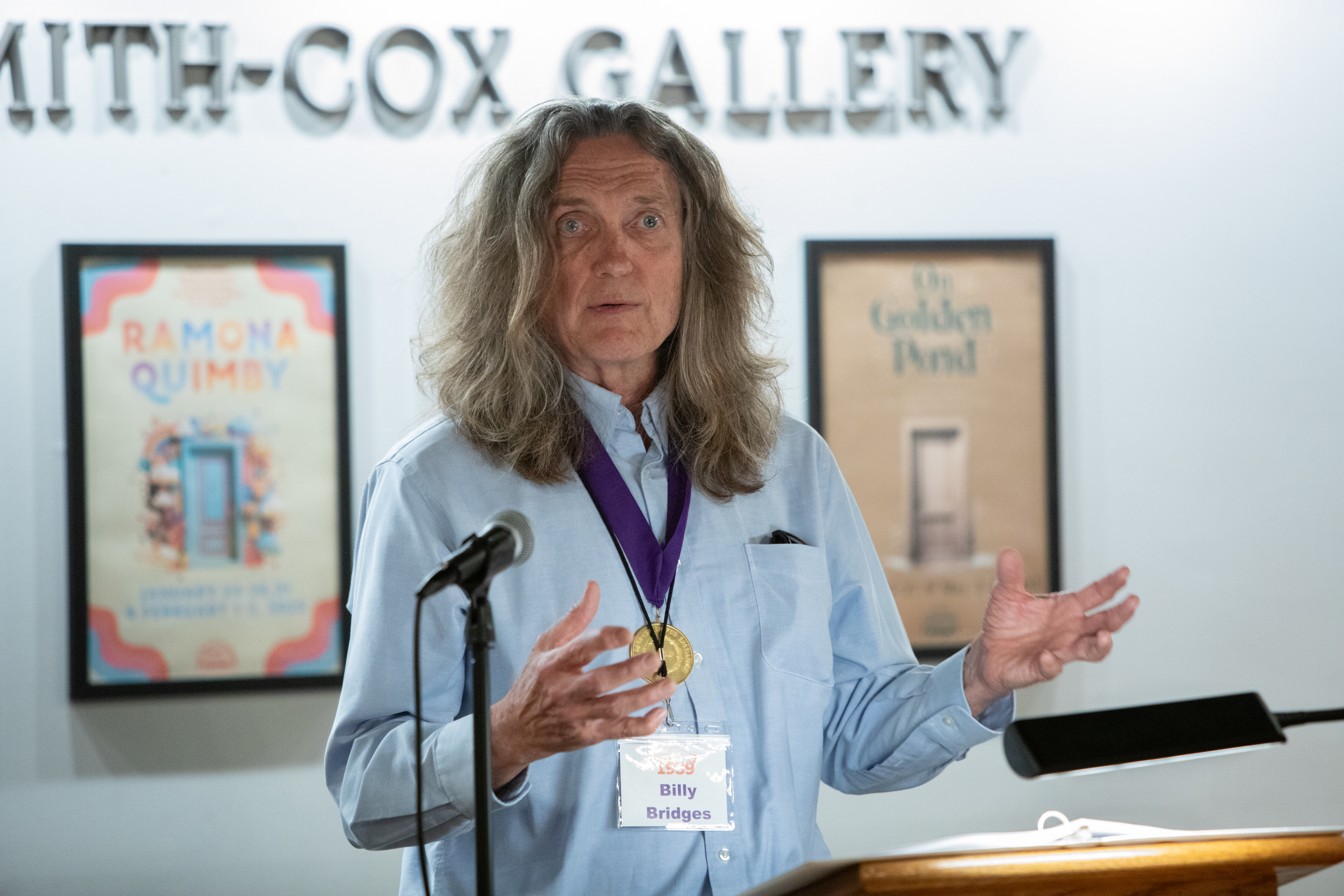
2023- William C. Bridges
An alumni distinguished professor in the School of Mathematical and Statistical Sciences, William C. Bridges Jr. has been a Clemson University faculty member for nearly 30 years, renowned throughout campus for his extraordinary dedication to research, teaching, and membership, serving both students and faculty. Bridges has served on over 300 graduate student advisory committees, as a graduate student advisor, and provided expert guidance to students from diverse disciplines as the ultimate "go-to" source for statistical expertise at Clemson University. Through mentoring, Dr. Bridges has published over 400 peer-reviewed papers, most co-authored with a Clemson student or faculty member. In the past academic year, he coauthored 34 published research articles and was supported by four extramural grants. These papers and grants sought to solve problems across diverse fields, e.g. Environmental Science, Crop Science, Microbiology, Math Education, Turfgrass Science, Veterinary Science, Agronomy, Geoscience, Genetics, and Poultry Science. Dr. Bridges provides critical consultation to research faculty across the university through connections in the SC Transitional Research Improving Musculoskeletal Health Center for Biomedical Research Excellence. Given the prolific nature of his research program and graduate mentoring, it is safe to say that Dr. Bridges is one of the most impactful faculty members at Clemson University.
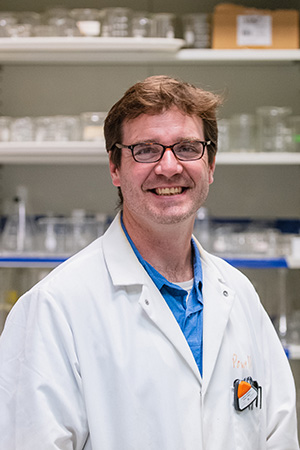
2022- Brian A. Powell
Dr. Brian A. Powell holds the Fjeld Professorship in Nuclear Environmental Engineering and Science and is jointly appointed in the Department of Environmental Engineering and Earth Sciences, School of Civil and Environmental Engineering and Earth Sciences as well as the Department of Chemistry at Clemson University. Dr. Powell is also a joint appointee at the Savannah River National Laboratory with the objective of building research collaborations between Clemson and SRNL. He previously held postdoctoral appointments at the Lawrence Livermore National Laboratory (2006-2008) and the Lawrence Berkeley National Laboratory (2005-2006). He has a B.S. degree in Chemistry from the University of Montevallo (1999), and M.S. and Ph.D. degrees in Environmental Engineering and Science from Clemson University (2001 M.S., 2004 Ph.D.). Dr. Powell returned to Clemson as an Assistant Professor in 2008 and was promoted to associate Professor in 2013 and Full Professor in 2016.
Dr. Powell’s research focuses on the treatment and storage of radioactive waste and the migration of heavy metals and radionuclides in the environment from natural or engineered systems. He has conducted sponsored research in a wide range of projects dealing with topics of environmental chemistry, radiochemistry, geochemical reaction modeling and thermodynamic database development, evaluation of nanoparticle behavior, subsurface migration of actinides and fission products, and related topics. These research projects have received over $22M in funding from the National Science Foundation, the Department of Energy, the Nuclear Regulatory Commission, the Department of Homeland Security, and the National Nuclear Security Agency. The knowledge gained from this work can be used to evaluate risk to human and environmental health posed by environmental contamination by nuclear materials, to design remediation strategies for contaminated sites, and to facilitate the use of safe disposal practices. Dr. Powell has published over 100 peer-reviewed journal articles, 2 book chapters, given over 200 technical presentations, and has graduated 15 Ph.D. students, 20 M.S. students, and advised 14 postdoctoral researchers. Based on this body of work, Dr. Powell was awarded the 2014 South Carolina Governor’s Young Researcher Award for Excellence in Scientific Research, a U.S. Department of Energy Early Career Research Award, and named the 2022 Clemson University Senior Researcher of the Year.
Dr. Powell was the Principal Investigator of the DOE EPSCoR project “Radioactive waste management: Development of multiscale experimental and modeling capabilities” funded at $7.25M from 2014-2020 and led a team of 24 faculty from Clemson, USC, and SC State, as well as 13 postdoctoral researchers, 15 Ph.D. students, 18 M.S. students, and 32 undergraduate student researchers. The effort has produced 50 peer reviewed publications and established South Carolina as a leader in nuclear waste remediation and analysis.
Dr. Powell has been committed to University service as a member of the Clemson Forward 2020 Phase I Research strategic planning committee, the Vice President for Research Advisory Board (2016-2020), and Faculty Senate from 2019-2022 including the roles of lead senator from the College of Engineering, Computing, and Applied Sciences (CECAS) from 2020-2022 and chair of the Senate Research Committee in 2021. Currently Dr. Powell serves as the Faculty Representative to the Clemson University Board of Trustees.
Dr. Powell has been married to Clemson graduate Melissa Tidwell Powell (2001 M.A. Professional Communications; 2004 M.S. Counseling) for nearly 20 years and they have a 12-year-old daughter Mae. They live in Pendleton where Melissa runs the local business Green Heart Awakening on the Pendleton square. The family enjoys hiking, camping, rock climbing, catching wild animals, cooking, music, and brewing beer.
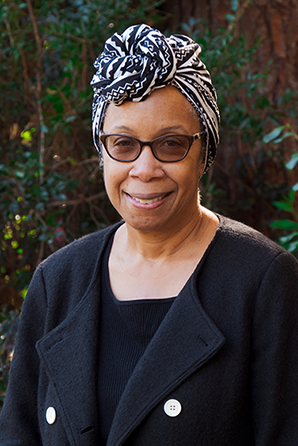
2021- Rhondda Robinson Thomas
Dr. Rhondda Robinson Thomas, Calhoun Lemon Professor of Literature, earned her Ph.D. in Literature at the University of Maryland. She completed her Master of Arts degree in Literature at the University of New Hampshire and Master of Science degree in journalism from the University of Georgia as well as a Bachelor of Science degree in communication-media/journalism from Columbia Union College (now Washington Adventist University). She researches, teaches, and publishes about 18th- and 19th-century African American literature and culture with a focus on the construction of identity in African American narratives and American slavery. Dr. Thomas is editor of volume 1 of the African American Literature in Transition, 1750-1800, which examines how social, political, and economic transitions coupled with conceptions of race, the impacts of revolution, and the effects of religion shaped the trajectory of authors’ lives and the production of their literature, to be released by Cambridge University Press in March 2022, and her essays have appeared in distinguished humanities journals, including American Literary History, African American Review, and Biography as well as in A History of African American Autobiography by Cambridge University Press and the Handbook of the African American Slave Narrative by Oxford University Press.
She also develops interdisciplinary public humanities projects that provide opportunities for various publics to research, document, and engage with topics like heritage, traditions, race, and history that help us to better understand the complexities of the human experience. After she began working at Clemson in 2007 and learned that the history of slavery and enslaved people was not included in the tours of the Fort Hill Plantation house, she began researching the story. As a sixth-generation South Carolinian, the descendant of both enslaved African Americans and white enslavers, Dr. Thomas was keenly interested in learning more about this history. Her search led to the development of the Call My Name interdisciplinary public humanities project that documents the history of African American enslaved persons, sharecroppers, convict laborers, wage workers, musicians, students, faculty, administrators, and staff who have contributed to Clemson's history through a traveling museum exhibits, digital archive, play production, videos, social media posts, programs and events, and publications, all designed to provide the public with multiple ways to engage with and learn from this history. She has expanded the impact of her work through collaborations with community and campus partners, including the Bertha Lee Strickland Cultural Museum and Lunney Museum in Seneca, the Clemson Area African American Museum, the Pendleton Foundation for Black History and Culture, Clemson’s Humanities Hub, and the Call My Name Student Advisory Board. In March 2020, her Call My Name Project received the Preserving Our Places in History Project Award from the South Carolina African American Heritage Commission. In November 2020, she published Call My Name, Clemson: Documenting the Black Experience in an American University Community in the Humanities and Public Life Series at the University of Iowa Press, which received an honorable mention award from the National Council on Public History in 2021. Most recently, she was appointed Coordinator of Research and Community Engagement for the Woodland Cemetery Historic Preservation Project which seeks to document and share the full story of the recently recovered 667 unmarked graves on the site and ensure the cemetery’s perpetual care.
Dr. Thomas has received several grants to support her public humanities projects from the National Endowment for the Humanities, the Whiting Foundation, South Carolina Humanities, and the Prindle Institute for Ethics at DePauw University as well as from the Office of the Provost, Division of Inclusion and Equity, College of Architecture, Arts, and Humanities, and gifts from the Clemson Foundation. She was selected as Clemson University’s Senior Researcher of the Year in 2021, and she received the Holman Research Award for outstanding achievement from the Department of English in 2020 and the Clemson University Research, Scholarship, and Artistic Achievement Award in 2019. Her hobbies include traveling, vegan cooking, sewing, and hiking.
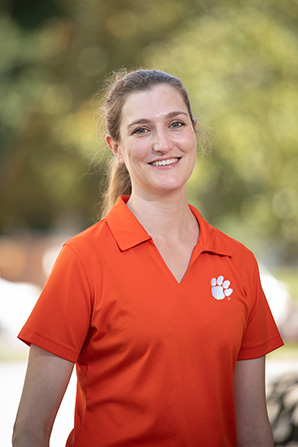
2020- Delphine Dean
Dr. Delphine Dean earned her Ph.D. in Electrical Engineering and Computer Science from the Massachusetts Institute of Technology (MIT) and is currently the Ron and Jane Lindsay Family Innovation Professor of Bioengineering at Clemson University. Her lab leads a wide range of studies focused on understanding the mechanics and interactions of biological systems across length scales. Her expertise is in nano- to micro-scale characterization of biological tissues including experimental techniques such as atomic force microscopy and mathematical modeling such as finite element analysis. In addition to the basic science work in the lab, Dr. Dean works on several applied translational design projects primarily aimed at enabling healthcare in low-resource areas here in the US and abroad in Tanzania and India. She is the recipient of the 2011 Phil and Mary Bradley Award for Mentoring in Creative Inquiry for her work in mentoring undergraduates at Clemson, where she currently mentors over 50 undergraduate students in creative inquiry research and design teams. These student teams work on a variety of projects from understanding the effect of ionizing radiation on tissue to developing medical technology for the developing world. During the COVID-19 pandemic, Dr. Dean set up Clemson’s first high-complexity clinical diagnostics (CLIA) lab on campus to run all of the university's COVID-19 screening tests. The lab runs tests for all of Clemson’s COVID-19 surveillance testing as well as testing for the community.
Other award winners
- Mary Beth Kurz (2019)
- Lisa C. Benson (2018)
- Terry M. Tritt (2017)
- Antonis Katsiyannis (2016)
- June J. Pilcher (2015)
- Catherine Mobley (2014)
- John Ballato (2013)
- Windsor Westbrook Sherrill (2012)
- Richard Figliola (2011)
- Melanie M. Cooper (2010)
- Webb M. Smathers (2009)
- William (Bill) Pennington (2008)
- Alma Bennet (2007)
- Donald M. McKale (2006)
- Ben Sill (2005)
- Art Young (2004)
- Kinly Sturkie (2003)
- A.P (Hap) Wheeler (2002)
- Jerry Waldvogel (2001)
- Chip Egan (2000)
- Judy Melton (1999)
- Larry Bauer (1998)
- Chalmers Butler (1997)
- Larry LaForge (1996)
- Fran McGuire (1995)
- Cecil Huey (1994)
- Budd Bodine (1993)
- Ray Turner (1992)
- John Idol (1991)
- Joel Brawley (1990)
- and Dixie Goswami (1989)
